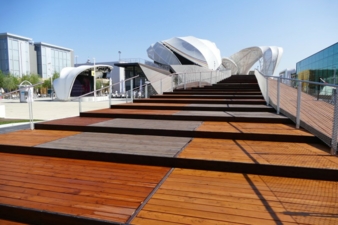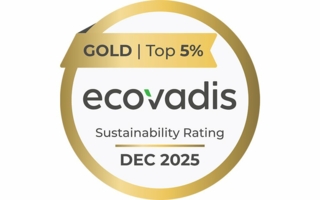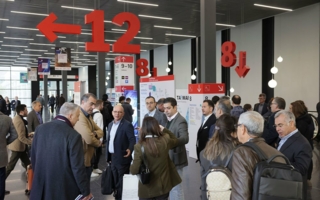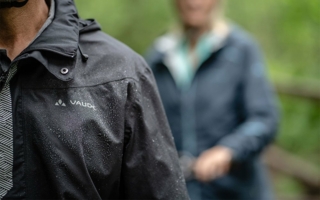29/06/2015 – “Fields of Ideas” — auf Deutsch lesen
Expo 2015: Sustainability from Berlin
Pleasant colours, organic shapes and sustainable production - the clothing donned by the staff manning the German Pavilion at the Expo 2015 in Milan reflects the pavilions “Fields of Ideas” motto as well as Germanys modern, creative and innovative image.
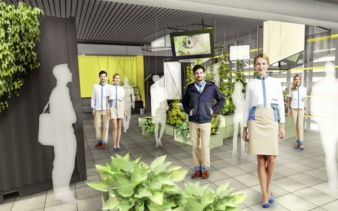
And the winners are…Ling Chen, Alisa Menkhaus, Roch Matuszek, Pascale Schmid, Rena Edzards, Julie Prévost, Carina Kobras and Maximilian Kattwinkel won in the category for the host and hostess clothing. Rena Edzards, Julie Prévost, Carina Kobras, Maximilian Kattwinkel, Jelena Barnert, Marlies Pätzold and Florian Luther won in the category for the management clothing (Bachelors Degree Fashion Design and Pattern-making)
The “Fields of Ideas” pavilion at the Expo 2015 in Milan, presents Germany as a landscape full of ideas – both in the literal and figurative sense. The exhibition intends to raise awareness of the forces of nature as an essential source of nutrition. This source must, in keeping with the principles of sustainability, be protected and used intelligently.
Students from the International University of Art for Fashion in Berlin (Esmod) designed the clothing for the hosts, hostesses and management of the German Pavilion. During the Expo which runs in Milan from May to October 2015, the collections will be worn by around 250 staff. When creating the pavilion uniforms, the issue of sustainability was at the heart of the design process, both in terms of the choice of materials and the fabric production process. Common Works, a Berlin-based production agency and sampling studio serving the clothing industry, was charged with making the collection.
“In keeping with the motto ‘Fields of Ideas`, the thought behind the German pavilion was to paint an holistic picture of a modern and sustainable Germany, embracing everything from the exhibition and the architecture right through to the staff`s clothing. This illustrates just how seriously we take the motto of Expo 2015, that being ‘Feeding the Planet, Energy for Life,” states Dietmar Schmitz, from the Federal Ministry for Economic Affairs and Energy (BMWi) and Commissary-General of the German Pavilion. The decision to commission a University of Art and thus also students to design the pavilion uniforms was all part of the overall concept.
“When creating our collections, we aligned our ideas to the German Pavilion. The colours and shapes reflect the pavilion content, and include features such as leaves, honeycomb and fields. These common themes create a connection to the pavilion and visually reinforce a sense of belonging within the team. For us, this is a fantastic opportunity to present ourselves and our ability to a wider audience,” comments Pascale Schmid, one of the winners.
Dietmar Schmitz: “It was really important to us to make sure that the overall production process – from the raw materials to the final manufacturing – but also the wearing and ultimately the disposal or recycling phases would have as little impact on the environment as possible."
When it came to selecting a producer for the collections, the Federal Ministry for Economic Affairs and Energy (BMWi) and organiser Messe Frankfurt were looking for a company that was committed along the entire supply chain to aspects such as renewable resources. Care was also taken to ensure that the producer avoided waste during the production and wearing phases, used alternatives to toxic substances in the manufacturing process, followed the principle of “Reduce, Reuse, Recycle or Compost”, and supported the research and innovation of sustainable products.
“We ultimately chose Common Works Modeproduktion, based in Berlin, because they not only use mostly environmentally friendly, organic materials but have themselves been GOTS certified since 2014," explains Erol Altunay of Messe Frankfurt. Common Works attaches much importance to the GOTS standard in its choice of organic substances. The “Global Organic Textile Standard”, or GOTS for short, defines environmental requirements, and is recognised as the world`s leading standard for the processing of textiles from organically grown natural fibres. All the trimmings, such as buttons, zips and yarns were naturally also certified in compliance with Oeko-Tex Standard 100.
The almost 2000 garments were produced in Europe – including the tops with long or short sleeves, the trousers, dresses, skirts, blazers and jackets as well as the belt bags. Common Works also committed to ensuring that the transportation of the raw materials to the clothing factory and delivery to the German Pavilion remained carbon neutral. The production agency, which specialises in sustainable manufacturing, is a member of the “Fair Berlin” association and the Partnership for Sustainable Textiles within the German Society for International Cooperation (GIZ).
To ensure the staff`s appearance at the Expo 2015 was perfect from top to toe, the creative minds behind the pavilion also found a suitable footwear solution. At first glance, the “Dune Low Top” sneakers from OAT Shoes BV in the colour“River Blue” look like relatively normal canvas trainers, but they are in fact 100 percent bio-degradable and even contain the germ buds needed for new growth (seeds are actually sewn into the shoe)! After the Expo, the shoes will be dug into the soil and wild flowers will grow in their place.
[Ingrid Sachsenmaier]
The World Exposition in Milan is open from 1 May to 31 October 2015. For more on this topic:

